How To Create An Emotional Eating Journal On Your Phone To Use Anytime, Anywhere!

Last Updated on 12/31/2023 by 58b6m
Conquering Emotional Eating: A Guide to Using An Emotional Eating Food Journal to Overcome Guilt
Our bodies are temples of the Holy Spirit which is probably why the enemy is constantly attacking it. One of the ways the devil attacks our bodies is through emotional eating.
That’s why I encourage you to start using an emotional eating journal…don’t worry I’ll be sure to tell you why a little later.
We will talk about what an emotional eating journal is, where to get one, the lies we tell ourselves about weight loss and so much more!
I’m going to give you some encouraging words of advice on how to overcome those feelings of guilt when we overeat or emotionally eat and how to journal to overcome these issues!
Oh yeah, and this post contains affiliate links to great products that will help you in your health journey. I will get a commission if you decide to buy from these links. Please let me know if you have any questions.
– What Is Emotional Eating
So what is emotional eating? When you emotionally eat you are eating as a way to cope with emotions that you don’t want to face like anxiety, hopelessness, loneliness, anger, stress, or sadness.
You’re eating without truly being hungry. Instead of dealing with these emotions that most people don’t like to acknowledge, they eat unhealthy food in order to make themselves feel better. I mean, let’s be honest.
When you emotionally eat, you’re not reaching for broccoli.
Instead, you want comfort food which is usually cheesy, creamy, and caloric. I love broccoli but I can’t say that it provides me with comfort which is the end goal of emotional eating.
In other words, it’s like saying “I feel bad emotionally but I don’t really know why and I don’t want to figure it out but I want to feel better. So I’m going to eat something because that provides me immediate feel-good results”. Okay, so I know no one actually says this.
Eating emotionally is done many times without you even realizing it. That’s the biggest problem and eventually, that leads to weight gain, diseases, and other health issues.
And the problem with emotional eating is not just physical. Emotional eating often leads to feelings of guilt and low self-worth.
And remember I said many times this kind of eating is done subconsciously so it’s important to recognize the signs and take steps to address the underlying causes. That’s where an emotional eating journal comes in.
Want to read Emotional Eating Food Journal later? Click here to save it to one of your Pinterest boards!

– What Is An Emotional Eating Food Journal & Its Benefits
We’ve talked about what emotional eating is but what is an emotional eating journal? Like I said earlier, emotional eating is done without you even noticing.
Well, an emotional eating journal is going to make that a thing of the past. Once you start using an emotional eating journal you will notice certain patterns in your eating habits.
Plus, you’ll begin to make connections between what you are eating and your current emotional state. In your journal, you can jot down and work through your thoughts and feelings, identify triggers, and find healthier ways to cope with your emotions.
It can also help you to stay accountable and motivated to reach your weight loss goals.
– An Example Of How Emotional Eating Works
Eating healthy and losing weight can sometimes feel like trying to get out of quicksand.
The harder you fight to pull yourself out of the pit the further down you sink.
I sometimes find that I’m in this constant cycle of eating healthy then falling off the wagon and then eating healthy again and then falling off the wagon and then…well, you get the picture.
It’s like this constant battle that seems impossible to overcome at times.
Then you have to deal with the guilt that comes along with failing over and over again or feeling like a failure.
But this guilt it’s counterproductive.
We might think that guilt is noble but usually, it produces feelings of shame because we want to continue to wallow in that same behavior that brought us shame and guilt in the first place.
Have you ever said things like “I’ve already eaten so much already so I might as well just keep eating?”
Or “I’ve been eating so poorly today that there’s no point in working out.”
Or “I already had an unhealthy meal and I cheated on my diet so the whole day is ruined and I will just keep eating poorly.”
See how that works?
You feel guilty and then you just decide to give in to the guilt because you already did wrong and you don’t believe that you can get forgiveness for what you’ve done so why even try?
This vicious cycle of emotional eating has to end…but how? I’m going to share with you some ways to overcome emotional eating
– The Way You Fill The Void Inside Of Yourself Instead Of Emotional Eating Might Surprise You
The best way to fill the void inside of you that causes you to overeat is by having a relationship with Jesus.
I can hear you saying “Wait…what does Jesus have to do with emotional eating”. Luke 4:18 says “ The Spirit of the Lord is upon me, because he hath anointed me to preach the gospel to the poor; he hath sent me to heal the brokenhearted, to preach deliverance to the captives, and recovering of sight to the blind, to set at liberty them that are bruised…”
This is Jesus telling us why He came down to earth. He came to heal the brokenhearted. If someone is eating their feelings away would we not say they are brokenhearted? If you eat emotionally, that means your heart is broken.
Maybe not in the typical way that we use the word.
Usually, we say someone is brokenhearted when they break-up with a boyfriend or girlfriend. But if you must turn to food to cope with painful emotions, is your heart not broken?
Maybe your heart was broken by abandonment, molestation, bullying, drug addiction, your parent’s divorce or a million other things that damage us emotionally. Whatever is causing you to be brokenhearted, Jesus is here to heal your heart.
Whatever it is that is causing you to eat emotionally, Jesus is here to heal that hurt inside of you and fill that void.
Click here to learn more about having a relationship with Jesus!
– How To Create An Emotional Eating Journal On Your Phone!
The beauty of journaling is that it is so easy to start. You can just use a piece of paper and grab a pen and start writing. However, I strongly suggest using something a little more formal. I use a digital emotional eating food journal that I created in Trello.

You can use my emotional eating journal for free by entering your email address below.
But you can see pictures of it above. In between those picture journaling prompts, you can write down what you are feeling!
And even better is that you can duplicate each section of this digital food journal as many times as you want. It’s so awesome!
Click here to get FREE access to this digital fitness planner & emotional eating journal!

– How to overcome emotional eating through journaling
I truly believe one of the gifts that God has given us, besides His son Jesus, is writing. I use journaling to process all kinds of emotions including those associated with my unhealthy eating habits.
Even if you don’t have a relationship with Christ, you can still use a journal as a powerful tool to overcome emotional eating. Journaling can help you identify emotional triggers, understand the connection between your emotions and eating habits, find healthy coping strategies, and create an action plan.
To get started, find a journaling format that works for you. This could be a traditional notebook, a digital journal, or even a simple spreadsheet. Then, set aside time each day to write in your journal, and be sure to include your thoughts and feelings, triggers, and healthy coping strategies.
By keeping an emotional eating journal, you can gain insight into your triggers and find healthier ways to cope. Through journaling, you can identify patterns and develop an action plan for conquering your emotional eating.
Yeah, journaling is amazing like that! Trust me…With the right tools and strategies, you can break the cycle of emotional eating and finally overcome the guilt and shame it causes. Here are some emotional eating journaling tips to start using today!
1) Take A Picture Of Every Meal & Write Down How You Feel Afterward
Write down how you feel after every meal. Now I won’t be hypocritical because I would never do that simply because my memory wouldn’t allow it.
However, if you would remember to do so, journaling after you eat would be an amazing thing. And not only that taking a picture of your meal before you eat and then journaling underneath that picture would be even more effective.
It would help you visualize exactly what you ate. Then later on, when you read your journal entry, you can see, hey, the last time I ate this meal I felt like (fill in the blank) afterward and I don’t want to feel like that again. Let me give you more details.
Let’s say you had a terrible day at work and a fight with your boyfriend. You didn’t meal plan and you could go to the vegan restaurant that you pass on your way home from work but you don’t want a salad.
Instead, you go to Five Guys and get a double cheeseburger with a side of their fries and a milkshake. And boy is that burger delish going down.
But then after you eat all that, you have no energy, and you feel a little empty which seems impossible after eating so much. The best thing to do in this situation is to write down exactly what it is that you’re feeling.
Or let’s create another scenario.
For instance, if you only wanted to eat one bowl of ice cream but you ate two then write that down in your emotional eating journal.
That is if you feel like eating two bowls of ice cream is a true failure.
It might be that you were saving up for that ice cream. You had been eating healthy all day because you knew you had some delish homemade ice cream at home and you really wanted to enjoy it.
However, if you only wanted to eat one serving of ice cream but you ate the whole container because you were feeling lonely and wanted a way to feel better, acknowledge what happened head-on. Then write down ways that you can prevent it from happening again, and learn from this mistake.
Write down how you feel and don’t censor yourself.
What want to do is take a proactive approach. Don’t allow yourself to wallow in shame and regret. View any emotional eating episode as a teaching moment.
View this as an experience to learn from and then forgive yourself while also asking for forgiveness from the Lord.
Remember that you’re learning how to undo years and years of bad eating habits.
You will not learn how to do this without making tons of mistakes.
We are human and we are going to mess up as we navigate this weight loss journey.
And guess what?
That is okay! And more on this coming right up!
2) Accept That You Emotionally Ate & Give Yourself Grace
In order to find true success on your weight-loss journey, you must learn to give yourself some grace and also accept the grace that God is sure to give you.
Once you start doing that when you do mess up again (and you and I both will) you will learn from it and continue to move forward toward your ultimate weight loss goal.
Now, please understand what I’m saying.
Yes, you should accept the fact that you may have overeaten but it’s important not to condone this behavior or make it a habit.
But what you should do is allow yourself to be human and know that you won’t always do things perfectly.
As you navigate these weight-loss waters those mistakes will be some of your best teachers.
Those mistakes will teach you what you should and should not do and what will and will not work.
So try your best to learn from any mistakes that you make in your weight loss journey. Write down in your emotional eating journal that you forgive yourself and move on to the next tip.
3) Use Your Food Journal To Make A Plan
Now that you know that you’ve messed up you acknowledged it, and you accepted that you’re flawed as a human being now it’s time to take action.
Take action on what you’ve learned from your mistakes.
For instance, like I mentioned earlier let’s say you ate two bowls of ice cream when you only meant to eat one.
What can you do next time to ensure that you only eat one bowl? What specific steps can you take to combat binge eating?
One idea is to pray beforehand for self-control.
Another idea is to start working on reducing your sugar cravings so that you won’t even want to eat more than one bowl.
Use your food journal to process your emotions about what you’ve eaten and make a meal and food plan to help make eating healthy much easier!
– What Will You Do Next Time You’re Tempted To Emotionally Eat?
Will you beat yourself up, throw your hands up in the air and say well I messed up and there’s nothing else I can do so I might as well keep messing up?
Or will you pull up your emotional eating food journal and start processing your feelings through your words? I hope you will use a journal for emotional support instead of cake and ice cream.
I’m not saying cake and ice cream are bad. I love them both! But they cannot provide therapy or emotional healing to your heart and they shouldn’t be expected to.
Jesus can heal the brokenhearted and one of the means He uses to do that is through writing. So use that gift that’s been given to us and watch and see how it changes your life!
If Emotional Eating Food Journal has helped you please share it!

On Desktop: To save on Pinterest, just click the red Pinterest save button that appears when you hover over an image.
On mobile: Press hard on the picture, tap share from the drop-down menu, and choose Pinterest from the list of options Please save it to a Prediabetes Tips or Diabetes Tips board.
Thanks!
Medical Disclaimer: While Healthy As You Can strives to provide the most accurate information, anything you read on this site is purely for informational or entertainment purposes and should NOT be considered medical advice or as a replacement for a doctor’s care, diagnosis, appointment, advice, etc. I am not a medical professional at all. Any information, tips, or ideas that you try as a result of reading this blog is tried at your, the reader’s, own risk.
Health Disclaimer: The owner of Healthy As You Can is not a physician, nutritionist, or medical professional. Any tips or ideas that you implement as a result of reading the information on this blog are done at your own risk. The results that may be discussed are not typical or guaranteed. Please talk to your doctor before starting any workout, exercises, diet or nutrition plan. Please stop any workout if you start to feel any pain. Healthy As You Can is not entering into a Doctor-Patient relationship with any reader and is not responsible for any errors or omissions of information.